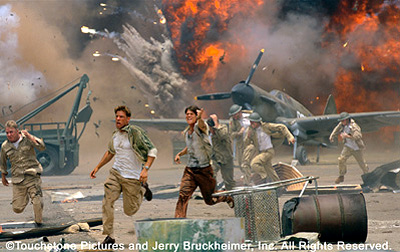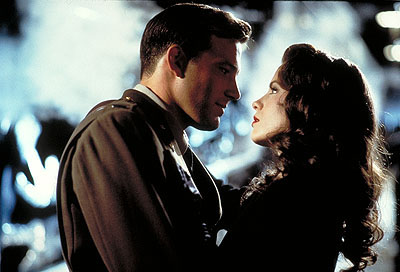

It is amazing that people identify Michael Bay with a distinctive filming style, especially since he has only directed four films. Still, Bad Boys, The Rock, and Armageddon all have touches of a stylistic flair and lack of real emotion that audiences love and critics detest. Bay is back with producing partner Jerry Bruckheimer for Pearl Harbor, the uncontested juggernaut of the 2001 summer movie season. This movie will do nothing to change the minds of his fans or critics. It looks great and has long sustained action sequences and a clumsy love story. Pearl Harbor is a mammoth film with a mammoth running time, and should actually probably be three films instead of one.
In order to put a personal perspective on the events, screenwriter Randall Wallace (Braveheart, The Man in the Iron Mask) shows everything through the eyes of a love triangle. Rafe McCawley (Ben Affleck, Bounce, Reindeer Games) and Danny Walker (Josh Hartnett, Blow Dry, The Virgin Suicides) are childhood friends whose only dream was to fly planes. On the eve of World War II they find themselves in the US Army Air Corps. Rafe falls for Evelyn Johnson (Kate Beckinsale, The Golden Bowl, Brokedown Palace), then volunteers to fight in Britain. Rafe is shot down, and Danny and Evelyn fear him dead. Both of them soon find themselves stationed at Pearl Harbor, and without realizing it they begin their own relationship. Rafe returns, causing tension amongst all three. The main question in the film is whom Evelyn will choose. But the acting is stilted thanks to some cornball dialogue, so all the feeling seeps out of the script.
The Japanese attack anchors the middle section of Pearl Harbor. It is a spectacular sequence, showing the destruction of the Pacific fleet, and easily portraying the chaos felt by the Americans. Japanese forces easily surprise the Americans, who suffer large losses, both physical and emotional. This is what Bay excels at, the he manages to maintain the momentum for most of the attack. He slows down only to focus on Rafe, Danny, or Evelyn for a short amount of time, showing their actions during the violence. Bay's penchant for rapid editing and explosions helps to convey the grand scale of the attack. The only real emotion in Pearl Harbor appears here, when Bay has his characters dealing with trapped sailors.
James Doolittle's (Alec Baldwin, Thomas and the Magic Railroad, State and Main) retaliatory raid on Tokyo rounds out the film. This last part is completely unnecessary, and seems there only so that America is not portrayed as a loser. It is filler, contributing little of anything to the film. There are other extraneous portions that help to pad the running time. Cuba Gooding Jr. (Men of Honor, Chill Factor) plays Doris Miller. Miller, like Doolittle, are actual historical figures. Doolittle was a naval cook who became one of the first African Americans honored for valor. Gooding is barely in the film, and this is too much like his last film, Men of Honor, where he again played an African American naval soldier who overcame prejudice to become the first to be a navy diver. Jon Voigt (Enemy of the State, A Dog of Flanders) also pops up for a short time as Franklin Roosevelt. The fact that they show Roosevelt in a wheelchair is the only notable aspect about his entire performance.
The absolute worst aspect of the film is Dan Akroyd (Diamonds, The House of Mirth). He plays a government analyst who postulated that the Japanese may attack Pearl Harbor. There is really no truth to this, and Bay acknowledges this. He has said that he wanted to show the 'essence' of Pearl Harbor, not necessarily the actual truth. To give him credit, he does do his best to portray the Japanese in a manner that is not stereotypically villainous. Hans Zimmer (Hannibal, The Pledge), another frequent collaborator of Bruckheimer, provides another excellent score. On a completely random note, Touchstone Pictures, a division of Disney, released Pearl Harbor. Zimmer also heads the music division at Dreamworks, a rival of Disney's. Playing both sides, eh Hans?